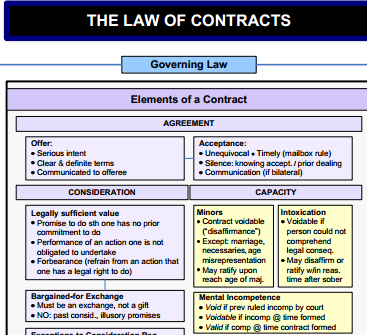Contract Law Basics for Small Businesses
Contracts are an essential part of running a small business. Whether you are hiring employees, working with vendors, or selling products and services to customers, having a solid understanding of contract law is crucial to protecting your business and ensuring that both parties uphold their obligations.
What is a Contract?
A contract is a legally binding agreement between two or more parties that outlines the terms and conditions of their relationship. This can include the goods or services being exchanged, the payment terms, delivery dates, and any other relevant details. In order for a contract to be enforceable, it must meet certain legal requirements, such as mutual assent, consideration, legality, and capacity.
Types of Contracts
There are several different types of contracts that small businesses may encounter, including:
Employment Contracts: These contracts outline the terms of employment for a new hire, including salary, benefits, job responsibilities, and termination procedures.
Vendor Contracts: These contracts establish the terms of a business relationship with a vendor, such as pricing, delivery schedules, and quality standards.
Customer Contracts: These contracts govern the sale of goods or services to customers, including warranties, returns, and payment terms.
Non-Disclosure Agreements (NDAs): These contracts protect sensitive information shared between parties and prevent it from being disclosed to third parties.
Key Terms in Contracts
When drafting or reviewing a contract, it is important to pay attention to the following key terms:
Offer: The initial proposal made by one party to another.
Acceptance: The agreement by the other party to the terms of the offer.
Consideration: The benefit that each party receives in exchange for fulfilling their obligations under the contract.
Legal Capacity: The ability of each party to enter into a contract, including being of legal age and mentally competent.
Legality: The requirement that the contract must be for a legal purpose and not violate any laws.
Enforcing a Contract
If one party fails to uphold their obligations under a contract, the other party may seek legal remedies to enforce the agreement. This can include suing for damages, specific performance (forcing the party to fulfill their obligations), or rescission (canceling the contract). In order to enforce a contract, it must be proven that a valid contract exists, both parties agreed to the terms, and one party breached the contract.
Protecting Your Business
To protect your small business when entering into contracts, consider the following best practices:
Consult with a Legal Professional: A lawyer can help you draft and review contracts to ensure that they are legally enforceable and protect your interests.
Document Everything: Keep detailed records of all communications, negotiations, and agreements related to the contract.
Review Carefully: Take the time to thoroughly review each contract before signing to ensure that you understand and agree to all terms.
Include Dispute Resolution Mechanisms: Consider including clauses that outline how disputes will be resolved, such as through mediation or arbitration, to avoid costly litigation.
By understanding the basics of contract law and taking steps to protect your small business, you can minimize the risk of disputes and ensure that your agreements are legally enforceable.
Conclusion
Contracts are the foundation of any business relationship, providing a clear framework for parties to work together and protect their interests. By understanding the key terms and requirements of contract law, small businesses can enter into agreements confidently and protect themselves from potential legal disputes. Remember to consult with a legal professional when drafting or reviewing contracts to ensure that your small business is protected and your agreements are enforceable.


